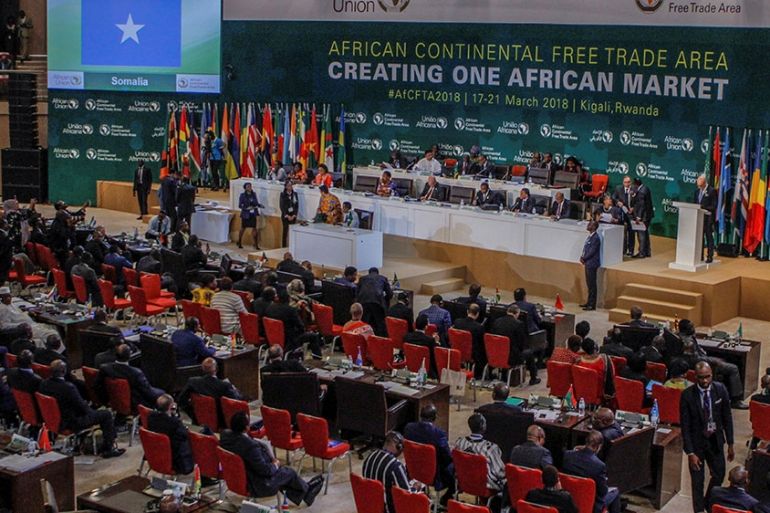Nigeria to sign African free-trade pact at AU meeting in Niger
If Nigeria signs up, it will clear a hurdle in the implementation of the African Continental Free-Trade Agreement.

Nigeria will sign a continental free-trade deal at an extraordinary summit of the African Union this weekend, bringing the duty-free movement of goods in the region a step closer.
The economy of Africa’s most-populous nation vies with South Africa to be the continent’s biggest and signing up clears a hurdle in the implementation of the African Continental Free-Trade Agreement. President Muhammadu Buhari last week received a report urging him to sign the deal from a committee set up to consider whether the country should join.
Keep reading
list of 4 itemsPhotos: Malnutrition threatens future Afghan generations
From prisoner to president in 20 days, Senegal’s Diomaye Faye takes office
Senegal’s fishermen pin hopes on new president to help them fill their nets
Nigeria will sign the deal at the summit in Niger “after extensive domestic consultations, and is focused on taking advantage of ongoing negotiations to secure the necessary safeguards against smuggling, dumping and other risks or threats,” the nation’s Presidency said on Twitter.
African intra-country trade is at about 15% of the total compared with 20% in Latin America and 58% in Asia, according to the African Export-Import Bank. This could more than double within the first decade after implementing the deal, the Cairo-based lender said in a report last year.
After four years of talks, the mechanics of the agreement will be negotiated in phases and it should be fully operational by 2030.
Double Growth
“We need to double the growth in Africa and I think this will certainly be one of the components to drive growth,” Hafez Ghanem, the vice president for Africa at the World Bank, said in an interview in Nairobi, Kenya’s capital. “Having free trade and one common market will be one of the components.”
Read more about Africa’s plans to create the world’s largest free-trade zone
The agreement came into force on paper in May. While Nigeria signing up will play a key part in the trade bloc reaching its potential, there are structural challenges, Aurelien Mali, vice president and sovereign analyst at Moody’s Investors Service, said in an emailed note.
“Power generation and logistics infrastructure are weak in most countries in the trade area, both of which play a crucial role in supporting trade and manufacturing in Africa,” he said.